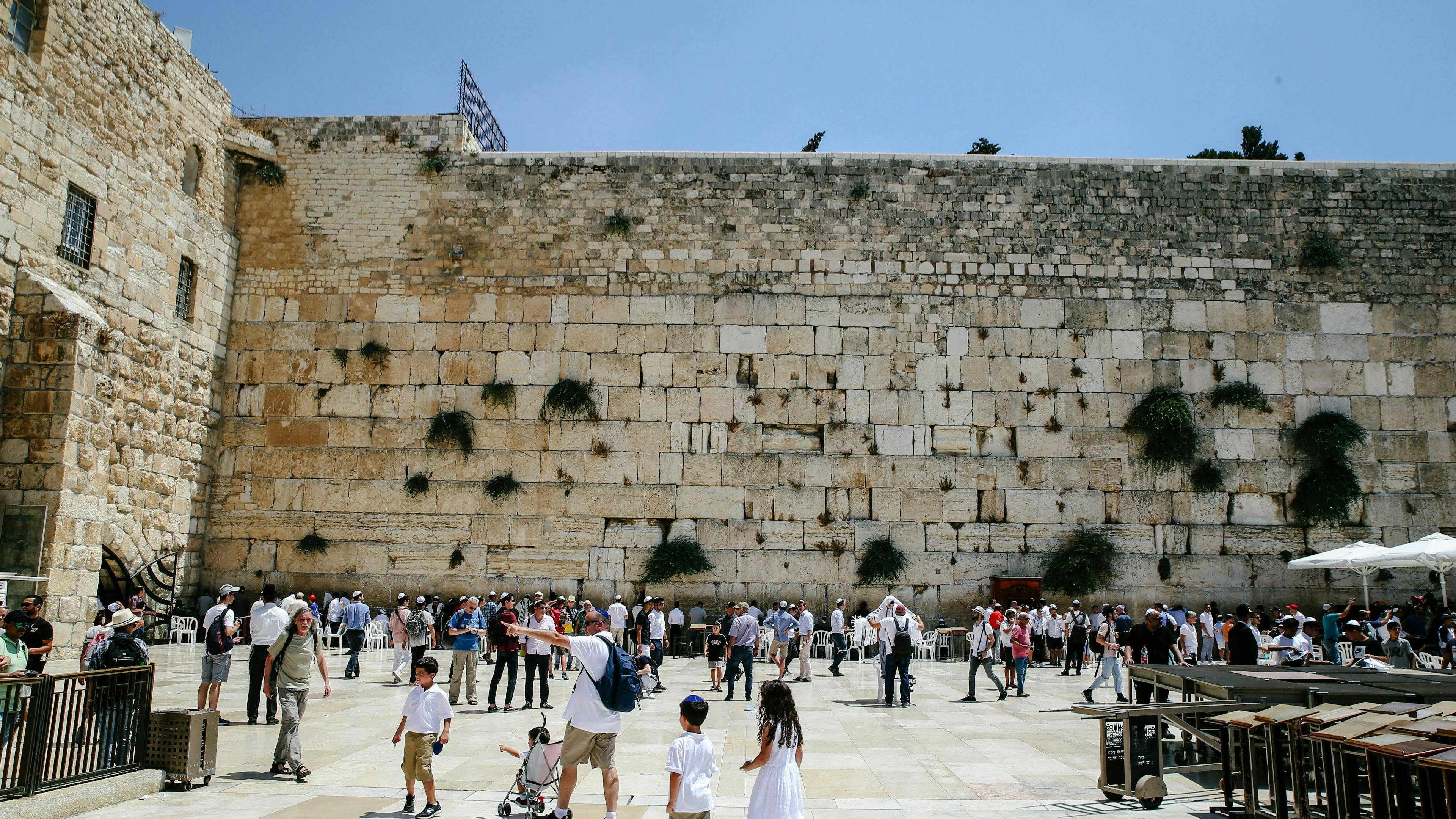What is Shavuot?
Shavuot or the Feast of Weeks in Scripture is found in Exodus 34:22-23:
Exodus 34:22-23
“And thou shalt observe the feast of weeks, of the firstfruits of wheat harvest, and the feast of ingathering at the year’s end. Thrice in the year shall all your men children appear before the Lord God, the God of Israel.”
And again in Deuteronomy 16 (here verses 9-10)
Deuteronomy 16:9-10
“Seven weeks shalt thou number unto thee: begin to number the seven weeks from such time as thou beginnest to put the sickle to the corn. And thou shalt keep the feast of weeks unto the Lord thy God with a tribute of a freewill offering of thine hand, which thou shalt give unto the Lord thy God, according as the Lord thy God hath blessed thee.”
The command behind Shavuot was to appear before the Lord if you were an adult male, to rejoice in the Lord, to keep his appointed feast for seven days, and to bring a free will offering. For the righteous in Israel, this was an occasion to publicly express joy and thankfulness to the Lord.
Can we truly keep Shavuot?
If Shavuot commands joy, but we are trapped in our sins by nature, how then can we possibly fulfill the commandments? In fact you can never attain the joy that God commanded in Shavuot without a change of nature. Jewish people can never have this unless they trust in the very messiah whom they reject: Jesus of Nazareth.
If you have not put your faith in Jesus the Messiah of the Jews, you will not be able to fulfill this command. This is because Jesus liberates his people from their sins, and yet, if you have not repented of your sins and not trusted in him as the Messiah promised in Genesis 3:15, 49:10, Deuteronomy 18:15-18, Psalm 22, Isaiah 9:6, chapter 53, Daniel 9:24-27, Micah 5:2, and many other places, then you must be miserable, because you are enslaved to your sin.
Though you may know it’s wrong to worship false gods, commit idolatry, ignore the Scriptures, break the sabbath, dishonor your superiors, abuse your inferiors, lie, cheat, steal, hate, kill, lust, envy, and so many more sins besides, if you find yourself either doing these things outwardly, or such desires bubbling up within you constantly inwardly – which is true of all men naturally, even the most halachically observant haredi Jew – then you are enslaved to your sins, and thoroughly miserable.
When was the fuller significance of Shavuot revealed?
A later name for Shavuot during the Greek speaking era was Pentecost. A significant parallel with the Old Testament Feast of Weeks took place among the disciples of Jesus of Nazareth. Fifty days after his crucifixion, which took place on the Passover, Jesus’ disciples were gathered in one house, when the Holy Spirit filled them in Acts 2:1-4:
Acts 2:1-4
“And when the day of Pentecost was fully come, they were all with one accord in one place. And suddenly there came a sound from heaven as of a rushing mighty wind, and it filled all the house where they were sitting. And there appeared unto them cloven tongues like as of fire, and it sat upon each of them. And they were all filled with the Holy Ghost, and began to speak with other tongues, as the Spirit gave them utterance.”
The Holy Spirit is the third person of the Godhead. Contrary to Maimonides’ idea of an indivisible and absolute personhood of God, the Bible recognizes three persons within the Godhead: Father, Son, and Holy Spirit. We know that the Holy Spirit indwelt his people in the Old Testament from verses such as Isaiah 63:11:
Isaiah 63:11
“Then he remembered the days of old, Moses, and his people, saying, Where is he that brought them up out of the sea with the shepherd of his flock? where is he that put his holy Spirit within him?”
The Holy Spirit is compared to fire in verses such as Isaiah 4:4:
Isaiah 4:4
“When the Lord shall have washed away the filth of the daughters of Zion, and shall have purged the blood of Jerusalem from the midst thereof by the spirit of judgment, and by the spirit of burning.”
And indeed, it was as tongues of fire that the Holy Spirit descended to the disciples. The Holy Spirit equipped them to speak in other tongues, signifying the going forth of the gospel to the world, as Jews from various nations across the Roman empire had gathered in Jerusalem for the feast.
Just as God had graciously given the law on the fiftieth day following the exodus from Egypt, so too he abundantly gave his Holy Spirit on the fiftieth day following Christ’s death.
We must be thankful to God
There are further parallels between the Pentecosts in the Tanakh and the New Testament, for just as God commanded joy from his people in the Old, so too he does in the New, and he makes us joyful by his Holy Spirit giving us psalms to sing, and truths to meditate upon, and prayers to pray, and sweet affections towards Christ Jesus. Thus we are a thankful and joyful people:
Hence Colossians 3:1-3:
Colossians 3:1-3
“If ye then be risen with Christ, seek those things which are above, where Christ sitteth on the right hand of God. Set your affection on things above, not on things on the earth. For ye are dead, and your life is hid with Christ in God.”
And Philippians 4:4:
Conclusion
For all we may speak of thankfulness, it is worth nothing if we are not thankful to the Triune God, who created us, and sent his Son Jesus the Messiah into the world to die for his people. We must be thankful, not for whatever we please, but rather for what the Messiah has done in history. He continues to save his people, making them willing to serve him, in the day of his power (Psalm 110:4). Are you one of his people? Just as many Israelites died in the wilderness, not reaching the Promised Land, so too many Jewish people will die and not reach heaven, to which Canaan pointed, because they disobey the good news of Jesus Christ, that Moses himself believed.
You must realize that the Old Testament festival of Pentecost serves to point us towards Jesus of Nazareth, who frees us from our sins. For how can we be thankful if we are still trapped in sin? Those bound in sin are miserable, but “happy is the people whose God is the Lord” (Psalm 144:15). And as Jesus Christ is the Lord (Psalm 110:1), indeed, God over all (Romans 9:5), only he may make us happy, by forgiving us of our sins and cleansing us from them. As the Psalmist declared:
Psalm 32:1-2
“Blessed is he whose transgression is forgiven, whose sin is covered. Blessed is the man unto whom the Lord imputeth not iniquity, and in whose spirit there is no guile.”
No longer do you need to be shackled to your sin and the misery that comes from it. Today is the day you can turn from your sins and put your faith in the Messiah of Israel. You can know the true joy and thankfulness to which God’s appointed Shavuot points.
Appendix:
Why were the completion of 50 days observed in Shavuot?
One thing you may not know is that there were fifty days exactly between the exodus out of Egypt, and the giving of the Law on Mount Sinai – and Shavuot marked this period. Although this is not expressly stated in Scripture, we can work it out by comparing different passages. (This is taught by rabbis such as Maimonides, as well as believed by Christians too).
We can work this out from the Israelite calendar, which was calculated according to the phases of the moon. Aviv (Nissan), the first month, had 29 days in it, and then the next month Ziv (Iyar) had 30 days in it. Aviv was a spring month, corresponding to our March/April. It makes sense to start the year with spring (equating to birth, as even the heathens have recognised in their Persephone myths, etc.), and end it with winter (corresponding to death). From Exodus 12:17, God says that the Israelites would eat the unleavened bread because on this selfsame day, he brought them out of Egypt, and in Exodus 12:18, we learn that this day is the 14th of Aviv. In Numbers 33:3, the Holy Spirit tells us that the Israelites left Rameses on the 15th day of Aviv. This is because the slaughter of the firstborn began the night of the 14th going into the 15th, specifically at midnight (Exodus 12:29), and then the Israelites plundered the Egyptians throughout the night, and headed out.
The Israelites came to Elim on the 16th day of the second month Ziv (Exodus 16:1), entering the Wilderness of Sin between Elim and Sinai. At least one further sabbath passes (Exodus 16:27) before they pitched in Rephidim (Exodus 17:1), Amalek came to fight Israel (Exodus 17:8), Jethro established a court system that is immediately set in motion (Exodus 17:26), and Jethro leaves (Exodus 17:27). This seems to all happen in about a two-week period, before they set off for Sinai (Numbers 33:15).
So we have the 16 days of Aviv (14th-29th), plus the 30 days of Ziv (1st-30th): a total of 46 days. I don't think Exodus 19:1 places Shavuot a week after the Passover, because it's not counting the 3rd month since the Passover, but the 3rd month of the year. The Israelites arrive in the third month (Exodus 19:1). Israel camps at Sinai (Exodus 19:2) - possibly overnight, and then Moses goes up to God - possibly the next day (Exodus 19:3). 6) The Israelites are told to prepare for the third day (Exodus 19:11, 19:15), and indeed on the third day, the Lord descended on Mount Sinai (Exodus 19:16 to the end). So if we've had one day of Israel camping at Rephidim, then the 3rd day from the day of Exodus 19:4 is the 50th day: Pentecost (16 in Aviv, 30 in Ziv, and 4 in Sivan = 50). Or if Moses goes up immediately (before the first night), but there was an extra day in Aviv or Ziv unaccounted for, then we would still be at Day 50.
As we can prove that Shavuot was a celebration of the 50th day, thus we see that God not only brought his people out of their bondage in Egypt, but after the seven weeks, gave his people a great help, by graciously giving his law etched on stone to Moses upon Mount Sinai.
The parallel with the New Testament is this: just as God gave his people the law on the 50th day after the Passover, so too he sent us his Holy Spirit more abundantly on the 50th day after Christ’s crucifixion. Let us praise the Lord, who has given us both the law and the gospel by his Holy Spirit!
More Topics
You might alsoo be interested in these topics.




